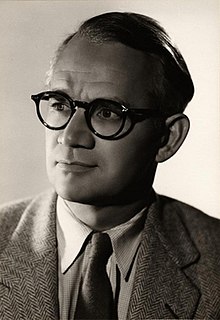A Quote by George Woodcock
You can be bound by physical things, as I am by certain sicknesses, but nevertheless you can still be free to recognize that all initiatives really come from yourself if you don't depend upon structures of government or structures of any kind.
Related Quotes
Human physical structures and intellectual structures are generally studied in different ways. The assumption is that physical structures are genetically inherited and intellectual structures are learned. I think that this assumption is wrong. None of these structures is learned. They all grow; they grow in comparable ways; their ultimate forms are heavily dependent on genetic predispositions.
Wholeness is sort of a dubious concept. Because in terms of the human body and literal wholeness and structures, you think: "here are the structures that help make me whole." Family, or school, or the city I live in. When those structures are dysfunctional or decaying, you end up kind of Frankensteining pieces from everywhere in order to make yourself sated and comfortable and alive.
As words are not the things we speak about, and structure is the only link between them, structure becomes the only content of knowledge. If we gamble on verbal structures that have no observable empirical structures, such gambling can never give us any structural information about the world. Therefore such verbal structures are structurally obsolete, and if we believe in them, they induce delusions or other semantic disturbances.
I think the structures of exclusion are more systematically built up in American society, for example, so that young girls interested in science eventually lose their confidence over time. The structures of exclusion work against them. We have other structures of exclusion in India, but not around modern scientific knowledge.
This new large-scale spiritual awakening is occurring primarily not within the confines of the established religions, but outside of those structures. Some of it, however, is also happening within the existing churches and religious institutions wherever the members of those congregations do not identify with rigid and exclusive belief systems whose unconscious purpose is to foster a sense of separation on which the egoic mind structures depend for their survival.
When people criticize me for not having any respect for existing structures and institutions, I protest. I say I give institutions and structures and traditions all the respect that I think they deserve. That's usually mighty little, but there are things that I do respect. They have to earn that respect. They have to earn it by serving people. They don't earn it just by age or legality or tradition.
My feeling is that a human being or any complex organism has a system of cognitive structures that develop much in the way the physical organs of the body develop. That is, in their fundamental character they are innate; their basic form is determined by the genetic structure of the organism. Of course, they grow under particular environmental conditions, assuming a specific form that admits of some variation. Much of what is distinctive among human beings is a specific manner in which a variety of shared cognitive structures develop.
I am surely a feminist filmmaker, but not because I set out to become one, or am trying to make any kind of statement. Rather, it's inherent in the act of expressing myself, as a woman who is deeply alienated from mainstream cinematic structures of seeing. I express myself and am instantly feminist.
One of the things I enjoyed when working in manga was when I couldn't tell where anything was going because there weren't narrative tropes and structures I was used to. After doing it for seven years, I got to the point where I did see structures. I did start to learn, but at first I didn't know where it was going. It was very exciting for me.




































